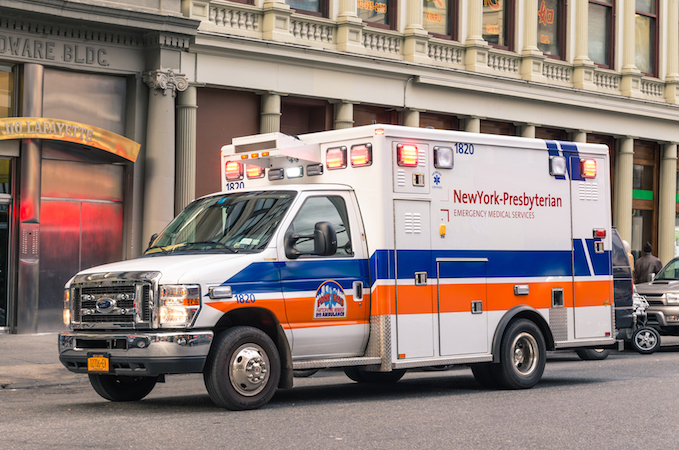
OVERVIEW
NEW WORDS
[responsivevoice voice=”US English Male” buttontext=”Play Audio”]
Nouns.
- accident (plural: accidents) an unexpected and undesirable event, especially one resulting in damage or harm.
- ambulance (plural: ambulances) a specially equipped vehicle used to transport the sick or injured.
- bruise (plural: bruises) an injury that does not break the skin but produces a discoloration.
- burn (plural: burns) an injury produced by fire, heat, radiation, electricity, or a caustic agent.
- CPR (Cardio-Pulmonary Resuscitation) an emergency procedure in which the heart and lungs are made to work by compressing the chest overlying the heart and forcing air into the lungs.
- disaster (plural: disasters) an occurrence causing widespread destruction and distress.
- emergency (plural: emergencies) a serious situation or occurrence that happens unexpectedly and demands immediate action.
- emergency medical technician (plural: technicians) a medical professional who gives emergency care to people outside of or on the way to the hospital.
- evacuation (plural: evacuations) the process of moving people from a dangerous place to somewhere safe.
- fire fighter (plural: fighters) a member of a fire department who tries to extinguish fires.
- fire station (plural: stations) a building for fire equipment and firefighters.
- fire truck (plural: trucks) large trucks that carry firemen and equipment to the site of a fire.
- first aid emergency treatment that is given to an injured or sick person, often by someone who does not have medical training.
- first aid kit (plural: kits) a collection of supplies and equipment that is used to give medical treatment.
- first responder (plural: responders) someone designated or trained to respond to an emergency.
- fracture (plural: fractures) a partial or complete break in the bone.
- hazard (plural: hazards) a potential source of harm.
- injury (plural: injuries) damage to your body caused by accidents, falls, hits, weapons etc.
- jail (plural: jails) a place of detention, especially for persons who are accused of committing a crime and have not been released on bail or for persons who are serving short sentences after conviction of a misdemeanor.
- lockdown (plural: lockdowns) a protocol followed in an emergency that involves confining people in a secure place, such as the confinement of prison inmates in cells after a disturbance, or the locking of students and teachers in classrooms after a violent attack.
- natural disaster (plural: disasters) an emergency situation posing significant danger to life and property that results from a natural cause such as a flood, earthquake, avalanche.
- paramedic (plural: paramedics) a person who is trained to give emergency medical treatment or assist medical professionals.
- patrolman (plural: patrolmen) a policeman who patrols or polices an assigned area.
- police officer (plural: officers) a policeman or policewoman.
- police cruiser (plural: cruisers) a car in which policemen cruise the streets; equipped with radiotelephonic communications to headquarters.
- police station (plural: stations) the headquarters of a unit of a police force, where those under arrest are first charged.
- prison (plural: prisons) a place for the confinement and punishment of persons convicted of crimes,.
- siren (plural: sirens) a device which creates a loud, often wailing sound as a signal or warning.
- sprain (plural: sprains) a painful wrenching or laceration of the ligaments of a joint.
- state trooper (plural: troopers) a member of a state police force.
- stretcher (plural: stretchers) a litter, usually of canvas stretched over a frame, used to transport the sick, wounded, or dead.
- terrorism the use of violence or the threat of violence, especially against civilians, in the pursuit of political goals.
- trauma (plural: traumas) a serious injury to the body, as from physical violence or an accident.
- wound (plural: wounds) an injury to an organism, especially one in which the skin or another external surface is torn, pierced, cut, or otherwise broken.
Adjectives.
- life-threatening an injury or illness that could cause one’s death.
Verbs.
- to evacuate remove someone from a place of danger to a safer place.
Expressions
- to be attacked to be hurt by someone using violence.
- to be mugged to be robbed.
- to be robbed to have something taken from you due to a threat of violence.
- to be wounded to suffer an injury.
[/responsivevoice]
VISUAL VOCABULARY
KEY PHRASES
GRAMMAR TIPS
QUIZ

